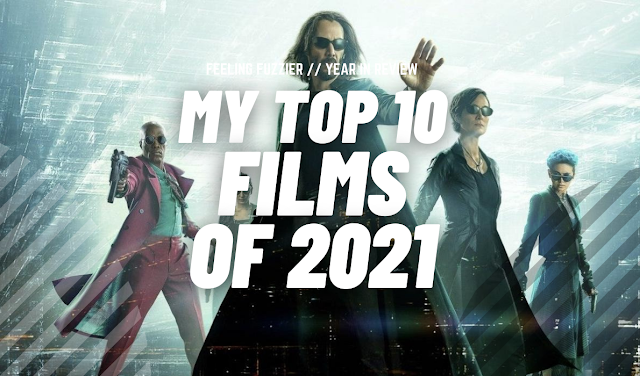
With 2021 finally in the rearview, it's time to look back and reflect on some of my favourite films from the year that was.
Is the movie industry in a better place now than it was a year ago? Nearly two years into this pandemic and it seems like we're starting to see signs of life, such as Spider-Man: No Way Home racking up them dollar bills at the box office.
But that's just one film; what about the rest? The simple fact is that, right now, more movies are struggling than flourishing – we're still a far cry from where we were in December 2019, for example, when mid-budget films like Knives Out, Little Women, Ford v Ferrari and Uncut Gems could compete with tentpoles like Star Wars and Jumanji.
However, that hasn't stopped plenty of fantastic films making their debut this year – in cinemas or on streaming services, let's not discriminate. For this list, I've picked from films that were released in Australia in 2021, which means some recent releases in the United States or overseas will have to wait until next year.
Honourable mentions: Promising Young Woman, Minari, The Night House, The Dry, Zack Snyder's Justice League, Don't Look Up, I Care A Lot, The Harder They Fall, Passing.
10th - The Matrix Resurrections (dir. Lana Wachowski)
Legacy sequels that leverage nostalgia are a dime a dozen these days; thankfully, Lana Wachowski's fourth Matrix film, The Matrix Resurrections, sidestepped this pitfall and went down the route of revisiting the warped world of The Matrix, recontextualizing its characters and its themes, and providing an intriguing, subversive coda that doesn't just regurgitate old ideas or plot beats.
Instead, The Matrix Resurrections takes a whimsical and metatextual angle, particularly in its lengthy first act. The plot – which revives Neo (Keanu Reeves) and Trinity (Carrie-Anne Moss), placing them back in the simulation and plaguing them with fleeting memories of their former lives – is full of big and bold swings that sometimes stick, sometimes don't. But I can't look past the audacity of Lana Wachowski to return to this world and upend it so drastically, when it would have been oh so easy to play it safe.
Reeves and Moss are fantastic too; Wachowski chooses to focus on them and their relationship. Amidst all the noisy gunplay and the high-wire kung-fu, the film always returns to Neo and Trinity – their romance, trauma and emotional baggage is what anchors everything. If that isn't an audacious choice for one of the most anticipated sci-fi action films of all time, I don't what is.
9th - A Quiet Place Part II (dir. John Krasinski)
Proving that his directorial career is far from a one-hit wonder, John Krasinski's A Quiet Place Part II took the foundation and fundamentals from the first film, refining and polishing them into something that's the quintessential sequel; bigger, bolder and possibly better.
Part II excels in part because it sticks to the key ingredients that made Part I so damn effective. Nerve-wracking tiptoeing tees up frenetic action, where whispered words make way for breathless panic and sudden desperation. It doesn't reinvent the wheel, but it doesn't have to, not when the formula that worked before continues to work so well.
Krasinski confirms his credentials as a confident filmmaker who is able to switch gears and up the ante when it calls for it; there's a couple of great crosscutting sequences in Part II, where the increasing energy, pace and stakes are neatly spliced together, before the inevitable climax and catharsis. A first-class continuation that complements the themes and screams of the original, what A Quiet Place Part II lacked in surprise, it more than made up for in scares. Slick direction and a smart screenplay ensures
8th - The Suicide Squad (dir. James Gunn)
After the first film crashed and burned, DC and Warner Brothers would have been forgiven for consigning the whole Suicide Squad concept to the scrapheap.
Instead, they peeped over the fence and poached one of Marvel's most successful imports, indie horror maverick James Gunn (Guardians of the Galaxy Volumes I and II), for a film that's part sequel, part reboot, part who-gives-a-crap.
By keeping what worked (which, let's face it, is pretty much just Margot Robbie's Harley Quinn) and dispensing with the deadwood (almost everything else), Gunn delivered on the initial promise of The Suicide Squad and then some.
The first 15 minutes perfectly sets the tone; there's guts and gore galore, with silliness in spades – and no-one will be spared. And then from there, we launch into a delightfully weird trek through Central America, with big, colourful characters like John Cena's Peacemaker and David Dastmalchian's Polka-Dot Man placed front and centre.
DC have copped some flak for deviating from the Marvel formula of establishing a set style and sticking to it. But Gunn's The Suicide Squad perfectly encapsulates why the filmmaker-led, scattergun approach can work; they might not all be bangers, but damn it feels good when one is.
7th - Last Night in Soho (dir. Edgar Wright)
Last Night in Soho sees British filmmaker Edgar Wright stray further from his comedic roots, with a sinister and snarling horror/thriller that mixes in elements of time travel and borrows its bold neon-soaked colour palette from Italian giallo cinema.
With the terrific twofer of Thomasin McKenzie and Anya Taylor-Joy at its centre, Last Night in Soho delights in capturing 60s Soho in all its shining showtime lights and seedy street corners. As two young woman with a strange, supernatural connection, McKenzie and Taylor-Joy continue to make their case for two of the best young actresses working today.
And Wright cleverly employs some practical camera trickery and visual effects to sell the connection between the two; between the present and the past. It's subtle and seamless, executed with such confidence so as to feel straightforward.
Overlooked at the box office, Last Night in Soho is exactly the kind of bold, original filmmaking that we should be championing. With a grisly, time-twisting plot that has something (ever so slight) to say, this is an impressive, original film for adults – something that is all too uncommon nowadays.
6th - West Side Story (dir. Steven Spielberg)
Who else but Spielberg would dare to remake a Best Picture winner – one that continues to be revered to this day – and knock it out of the park. The 2021 iteration of West Side Story is a soaring cinematic achievement that just sweeps you up and carries you along for two-and-a-half joyous hours.
Spielberg's affection for the text radiates from every frame; his choreographed camerawork matches the energy and flow of the dazzling dancing, with wonderful wide shots that capture the cast going full beans and flashes of vibrant Latin American fashion and colour amidst the drab, soon-to-be-bulldozed brownstones. And what a cast too; Ariana DeBose's Anita, David Alvarez's Bernardo, Mike Faist's Riff are fantastic, but it's newcomer Rachel Zegler who shines the brightest as Maria.
5th - Another Round (dir. Thomas Vinterberg)
Stuck in a rut and surrounded by apathetic, unmotivated students, four teachers at a Danish secondary school navigate their respective midlife crisis by embarking on a social experiment – to see if maintaining a blood alcohol level of 0.05 per cent throughout the day will make them more relaxed, more creative and more engaging teachers, parents and lovers.
What starts out as quite a comical concept, soon turns into something more insightful and critical. Vinterberg's film, which places the enigmatic Mads Mikkelsen in the starring role, strives to unpack drinking culture and our reliance on it to wash away life's troubles. Rather than facing up to their issues, the quartet lean into their hedonistic thesis – which leads them down a winding road that is oftentimes funny and oftentimes melancholy.
In the hands of a Hollywood filmmaker, this would have been a straight-up comedy, starring the likes of Will Ferrell. But with a European sensibility at the helm, Another Round manages to straddle that divide between tragedy and comedy – until we arrive at a poignant and cathartic final act, ending on a memorable moment of bittersweet release. The film embraces its own contradictions to revel in the aimlessness of the midlife crisis and the danger of drink. Well worth a watch, particularly for the nuanced performance from Mikkelsen.
In the hands of a Hollywood filmmaker, this would have been a straight-up comedy, starring the likes of Will Ferrell. But with a European sensibility at the helm, Another Round manages to straddle that divide between tragedy and comedy – until we arrive at a poignant and cathartic final act, ending on a memorable moment of bittersweet release. The film embraces its own contradictions to revel in the aimlessness of the midlife crisis and the danger of drink. Well worth a watch, particularly for the nuanced performance from Mikkelsen.
4th - The Last Duel (dir. Ridley Scott)
Criminally overlooked at the box office in October, Ridley Scott's sprawling medieval clash The Last Duel is exactly the kind of big-budget, star-studded affair that Hollywood has forgotten how to make in the last 20 years, unless it has a superhero in it.
With a cast that boasts Matt Damon, Ben Affleck, Jodie Comer and Adam Driver, The Last Duel is an ambitious and engrossing historical epic where 83-year-old Scott reaffirms that he swings for the fences, each and every time. It's every inch the $100 million historical film that Hollywood – and Scott himself – used to make, jam-packed with weighty themes, practical effects, swordplay, suits of armour, dodgy accents and wacky wigs (we're looking at you, Matt Damon).
With scope and scale to spare, Scott is still one of the best in the business – and The Last Duel is both technically impressive and narratively, with a Rashomon-inspired storyline that sees conflicting, overlapping recounts of the same incident from Damon, Driver and Comer. A #MeToo story in a medieval setting, the film uses a modern lens to critique antiquated gender roles and misogyny, thanks to some subtle shifts in perspective and fantastic performances from Comer and Driver especially.
3rd - No Time To Die (dir. Cary Fukunaga)
After a string of delays set it back almost two years, Daniel Craig's fifth and final outing as 007 was a fitting farewell to his tenure in the role. There have been funnier Bonds and there have been cooler Bonds; but there has never been a Bond quite like Craig, and No Time To Die (for all its faults, of which there are a few) perfectly encapsulated the quote/unquote Craig era.
Credit where it's due, Fukunaga didn't let Craig cruise into retirement. No Time To Die makes some big swings and most of them stick. The plot is classic Bond shit, dialled up to 11 – a plot to destroy the world using cutting-edge tech that doesn't make a lick of sense, orchestrated by a scarred villain who lives on a secret island lair. There's a globe-trotting middle act, some gadgets and vehicles that transform, a ticking clock finale and some inventive, kinetic action sequences along the way. Great stuff all round.
Plus, Craig has never been better as Bond; his entourage (Naomie Harris, Ben Whishaw, Ralph Fiennes, Jeffrey Wright) are all back onboard; newcomers like Ana de Armas and Lashana Lynch takes turns stealing the show; and Lea Seydoux actually gets to make an impression this time, her second film in the role as Bond's on again, off again squeeze, Madeleine.
After such a long stint in the role, it was great to see Craig go out on a high. For many people, No Time To Die would have been the first film they saw back in theatres after months and months streaming from the 'sofaplex'. And what better way to usher audiences back into cinemas than a classic Bond caper. Loved it.
Plus, Craig has never been better as Bond; his entourage (Naomie Harris, Ben Whishaw, Ralph Fiennes, Jeffrey Wright) are all back onboard; newcomers like Ana de Armas and Lashana Lynch takes turns stealing the show; and Lea Seydoux actually gets to make an impression this time, her second film in the role as Bond's on again, off again squeeze, Madeleine.
After such a long stint in the role, it was great to see Craig go out on a high. For many people, No Time To Die would have been the first film they saw back in theatres after months and months streaming from the 'sofaplex'. And what better way to usher audiences back into cinemas than a classic Bond caper. Loved it.
2nd - Belfast (dir. Kenneth Branagh)
An intimate autobiographical film from Kenneth Branagh, Belfast is an unassuming and quietly charming coming-of-age tale, which captivates its audience through the stark contrast of domestic bliss and terrifying chaos.
Set in Belfast during the beginning of The Troubles in the 1960s, the film recounts a period of Branagh's own childhood through the eyes of a young boy called Buddy and his Protestant parents, played by Jamie Dornan and Caitriona Balfe. Targeted by their Roman Catholic neighbours, the family are torn between staying in Belfast, which is more and more dangerous with every passing day, or moving overseas to England or even Australia, to escape the growing violence.
For a film punctuated with shocking bursts of tumult, Belfast is a sweet, sentimental affair that more often that not makes your heart burst with joy and laughter. Branagh's screenplay is witty and uplifting, his work behind the camera is sublime and effective, and the performances he extracts from his cast – which includes the likes of Judi Dench, Ciaran Hinds and Colin Morgan – are powerful and nuanced. The themes are universal – home, family, place, belonging – something which makes the film broadly appealing and impactful.
1st - Dune (dir. Denis Villeneuve)
Famously unfilmable, Frank Herbert's influential novel Dune has eluded a definitive cinematic adaptation – until now.
Where Dune excels, is in making Herbert's dense, oftentimes impenetrable mythos feel interesting and digestible to newcomers. Director Denis Villeneuve sticks to the adage 'show don't tell' – the audience, even those going in cold as I did, won't have a hard time following the story or the nuances of this rich universe. Come the end, you too will be able to wax lyrical about everything from the Gom Jabbar and the Sardaukar to the Bene Gesserit and the Kwisatz Haderach. It's complex, but not confusing.
The ambition of Dune is akin to Jackson's Lord of the Rings or Lucas' original Star Wars. Hans Zimmer's unorthodox and seismic score is the perfect accompaniment to gorgeous production design (an intriguing juxtaposition of militaristic urbanism, elemental stonework and exotic touches), Greig Fraser's cinematography captures the sheer scale of exotic worlds and vast armadas in rich, spellbinding colour and the actors – Timothee Chalamet, Rebecca Ferguson, Oscar Isaac, heck even Jason Momoa – understand the assignment. Yeah, the jargon is goofy – but the cast doesn't treat it as silly.
The ambitious first chapter in what has the potential to be an era-defining cinematic saga, Dune sees Villeneuve mix emotion, spectacle and artistry in equal measure. Hands down the best film of the year.
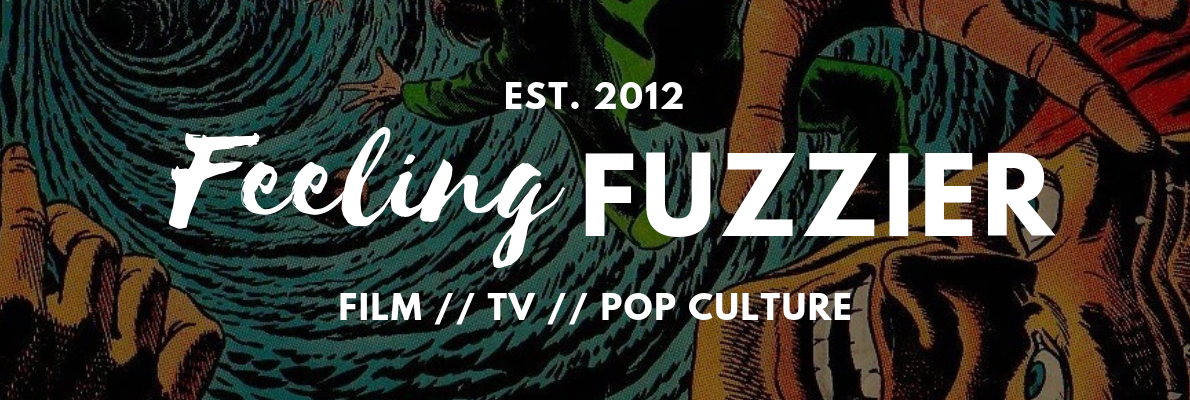




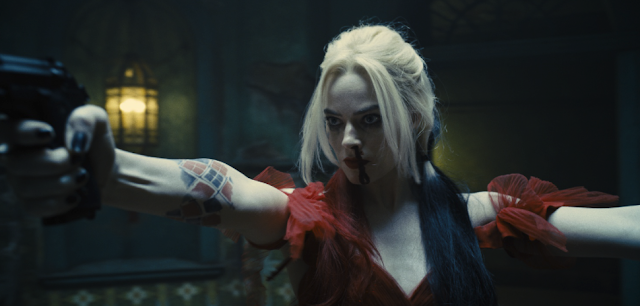




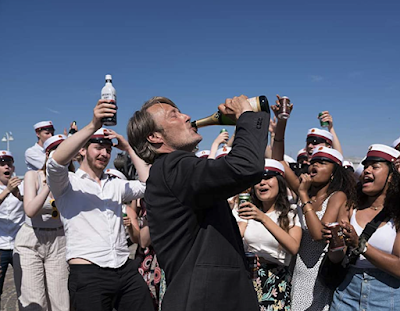
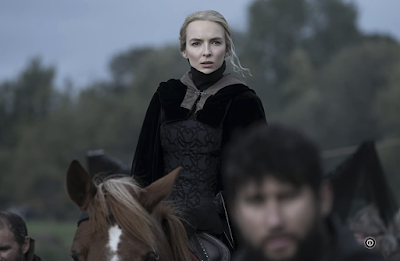

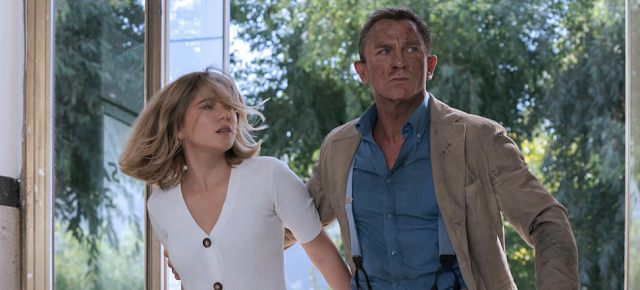
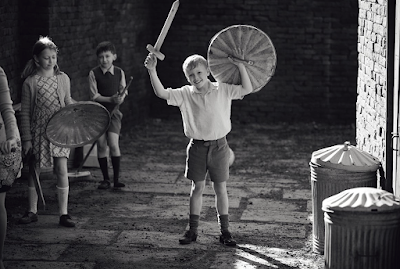
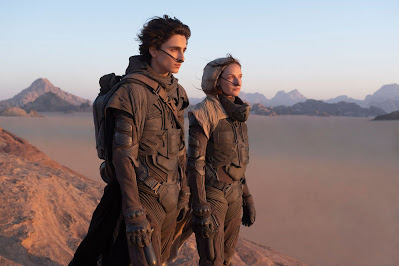

No comments:
Post a Comment